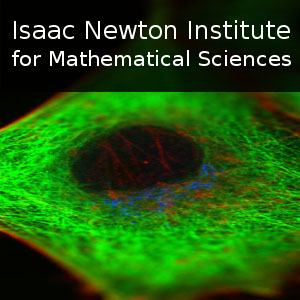Advancements in Hybrid Iterative Methods for Inverse Problems
Duration: 49 mins 30 secs
Share this media item:
Embed this media item:
Embed this media item:
About this item

| Description: |
Chung, J
Tuesday 31st October 2017 - 16:30 to 17:20 |
|---|
| Created: | 2017-11-02 13:42 |
|---|---|
| Collection: | Variational methods and effective algorithms for imaging and vision |
| Publisher: | Isaac Newton Institute |
| Copyright: | Chung, J |
| Language: | eng (English) |
| Distribution: |
World
|
| Explicit content: | No |
| Aspect Ratio: | 16:9 |
| Screencast: | No |
| Bumper: | UCS Default |
| Trailer: | UCS Default |
| Abstract: | Hybrid iterative methods are increasingly being used to solve large, ill-posed inverse problems, due to their desirable properties of (1) avoiding semi-convergence, whereby later reconstructions are no longer dominated by noise, and (2) enabling adaptive and automatic regularization parameter selection. In this talk, we describe some recent advancements in hybrid iterative methods for computing solutions to large-scale inverse problems. First, we consider a hybrid approach based on the generalized Golub-Kahan bidiagonalization for computing Tikhonov regularized solutions to problems where explicit computation of the square root and inverse of the covariance kernel for the prior covariance matrix is not feasible. This is useful for large-scale problems where covariance kernels are defined on irregular grids or are only available via matrix-vector multiplication, e.g., those from the Matern class. Second, we describe flexible hybrid methods for solving l_p regularized inverse problems, where we approximate the p-norm penalization term as a sequence of 2-norm penalization terms using adaptive regularization matrices, and we exploit flexible preconditioning techniques to efficiently incorporate the weight updates. We introduce a flexible Golub-Kahan approach within a Krylov-Tikhonov hybrid framework, such that our approaches extend to general (non-square) l_p regularized problems. Numerical examples from dynamic photoacoustic tomography and space-time deblurring demonstrate the range of applicability and effectiveness of these approaches. This is joint work with Arvind Saibaba, North Carolina State University, and Silvia Gazzola, University of Bath. |
|---|---|
Available Formats
| Format | Quality | Bitrate | Size | |||
|---|---|---|---|---|---|---|
| MPEG-4 Video | 640x360 | 1.94 Mbits/sec | 721.16 MB | View | Download | |
| WebM | 640x360 | 472.62 kbits/sec | 171.35 MB | View | Download | |
| iPod Video | 480x270 | 522.28 kbits/sec | 189.35 MB | View | Download | |
| MP3 | 44100 Hz | 249.73 kbits/sec | 90.63 MB | Listen | Download | |
| Auto * | (Allows browser to choose a format it supports) | |||||

